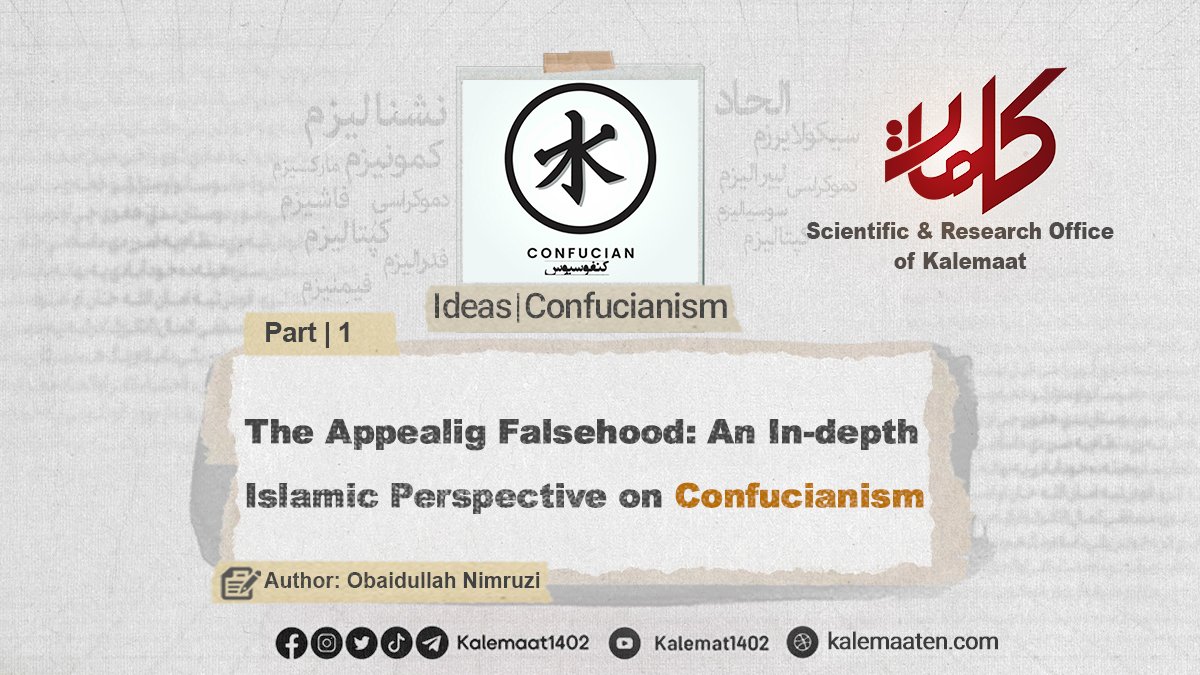
Author: Obaidullah Nimruzi
The Appealing Falsehood: An In-depth Islamic Perspective on Confucianism (Part One)
Introduction to the Research
Keywords: Confucianism, Tawheed (Monotheism), Reason and Revelation, Resurrection, Critique of Human Philosophies and Religions
Abstract
In a world where the diversity of philosophical and ethical schools has complicated the pursuit of truth, distinguishing between an attractive falsehood and a humble truth requires deep analysis and criterion-based evaluation. One such school—Confucianism—has influenced the Eastern cultural sphere for centuries, presenting itself under the guise of etiquette, humanism, and social reform. This doctrine, attributed to Confucius, a Chinese thinker of the 6th century BCE, is analyzed in this research through a theological and philosophical lens to examine its foundational principles in light of Islamic Tawheed, Revelation, and the Afterlife.
Based on Islamic teachings, this study reveals that despite its moral appearances, Confucianism lacks monotheistic content, denies heavenly revelation, and neglects the concept of the Resurrection. These deficiencies place it outside the framework of divinely-revealed religion, categorizing it instead among man-made belief systems and false doctrines. The final part of the research also examines the political use of Confucianism in contemporary secular regimes—particularly in the People’s Republic of China.
Introduction
From the dawn of human history, two paths have consistently shaped human thought and behavior: the path of divine guidance based on revelation, and the human path based on individual experience and reason. The first path is that of the prophets and their followers who walk in the light of God, while the second belongs to philosophers and human thinkers who, without recourse to revelation, seek order, meaning, and morality in life. Among the most renowned of the latter group is a man named Confucius, who lived in 6th-century BCE China and founded a doctrine later known as Confucianism.
Unlike many ancient religions, Confucianism bears little trace of mythology or overt deity worship. Instead, it emphasizes respect for parents, social order, honesty, loyalty, humility, and general decorum, offering a model of public morality that many find attractive and practical. However, from an Islamic perspective, the concern lies in the fact that this school is founded on neither divine revelation, heavenly prophethood, nor pure monotheism. Its foundational principles are based on naturalism, social customs, and collective reason. Rather than the One Creator, it posits an ambiguous concept of 天 (sky) as a substitute—a concept that is seen more as a symbol of cosmic order or natural law than a Creator of the universe.
It is at this juncture that the necessity of re-examining this doctrine from the viewpoint of Islam—the religion of the Final Prophet and the most complete Shariah—becomes clear. Islam rests upon three fundamental pillars: Tawheed (monotheism), Prophethood, and the Hereafter. Any doctrine that denies or neglects any of these, from the Qur’anic perspective, lies outside the realm of divine guidance: “إِنَّ الدِّينَ عِندَ اللَّهِ الْإِسْلَامُ” [Āl ʿImrān: 19] Translation: Indeed, the religion in the sight of Allah is Islam. “وَمَن يَبْتَغِ غَيْرَ الْإِسْلَامِ دِينًا فَلَن يُقْبَلَ مِنْهُ…” [Al Imran: 85] Translation: Whoever seeks a religion other than Islam, it will never be accepted from him…
Moreover, the great Sunni scholars—particularly Imam Abu Hanifah (MABH)—emphasized in al-Fiqh al-Akbar that faith without pure monotheism, divine revelation, and certainty in the Hereafter, even if adorned with ethics, is deficient and rejected. In the Maturidi theological tradition, reason plays a significant role in understanding religion, but it can never replace revelation. The knowledge of Allah Almighty, determining the path to salvation, and the ultimate order of human life cannot be reached without divine guidance.
This research, relying on the original Confucian texts, classical Islamic theological works, and a historical-analytical study of Confucianism’s role in modern political and cultural systems—especially in East Asia—aims to provide a comprehensive, critical, and scholarly picture of Confucius and his doctrine in contrast with Islam.
The purpose of this study is not to cover all historical or sociological dimensions of Confucianism. Rather, its primary focus is on analyzing the doctrinal errors of this school from the standpoint of Islamic monotheism. In doing so, the work strives to offer a deep and foundational reflection rooted in Islamic tradition and scholarly heritage in response to the superficial glorification of Eastern philosophies.
It is hoped that this modest effort will serve as a starting point for a scholarly movement in critiquing non-monotheistic doctrines that may appear ethical and humanitarian on the surface but are, in essence, devoid of the truth of faith. Through this analysis, the Muslim reader will understand that “not every virtue leads to salvation,” and “not every order is divine”—for salvation is attained only through revelation and the path of the Prophets.
In other words, this research seeks to systematically analyze and critique Confucianism from the theological perspectives of Tawheed, Prophethood, and the Hereafter, drawing upon the philosophical and theological legacy of Sunni scholars.
Continues…


